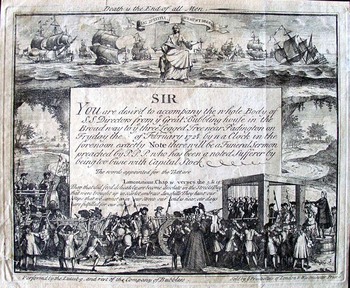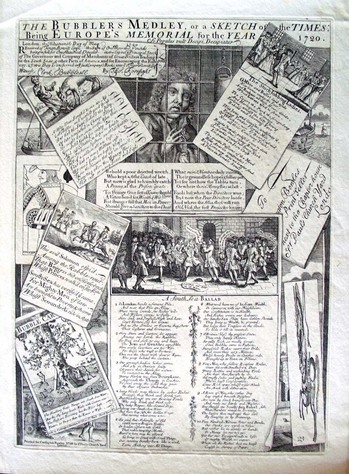According to a story in The Financial Times, Sir Isaac Newton (1643-1727) lost £20,000 in the 1720 South Sea Company stock crash and is reported as having said, “I can calculate the movement of the stars, but not the madness of men.”
In a single year, the price of the South Sea Company stock rose to £1,000 per share and then, dropped to £150. People from all walks of life lost money, sometimes everything they owned, leading to a country-wide frenzy. In the following year, there were reports of widespread fraud. Poems were written and caricatures were drawn satirizing the many fools who were caught up in the South Sea Bubble. The fools were known as the Bubblers.
“Death is the End of all Men” is the declaration of this ticket for the “Bubblers funeral.” Satirically presented to the directors of the South Sea Company, the ticket invites the holder to “accompany the whole Body of S.S. Directors from ye Bubbling house in the Broad way…” in a funeral procession “to ye three Legged Tree near Padington on Fryday the of February 1720/1.”
Its writer, engraver, and publisher George Bickhan is perhaps best known for the writing manual The Universal Penman, issued in 52 parts from 1733 to 1748. [Cotsen Folios 13674]
In the top center of this satire on the South Sea Company stock collapse is a man behind bars with a begging pot. The rest of the sheet is filled with trompe l’oeil ballad broadsides, presenting overlapping stories about people who lost their fortune in the scandal of 1720. At the bottom right is an anamorphic image of a man on a horse, perhaps a coded message to escape if you can.


People from all walks of life lost money, sometimes everything they owned, leading to a country-wide frenzy. In the following year, there were reports of widespread fraud.
Thank for sharing such nice post with us!!!!!
Thanks for all of this, lovely, really. I should point out though that in the leading line of the post you mention I. Newton's daughter--unfortunately Newton had no children.